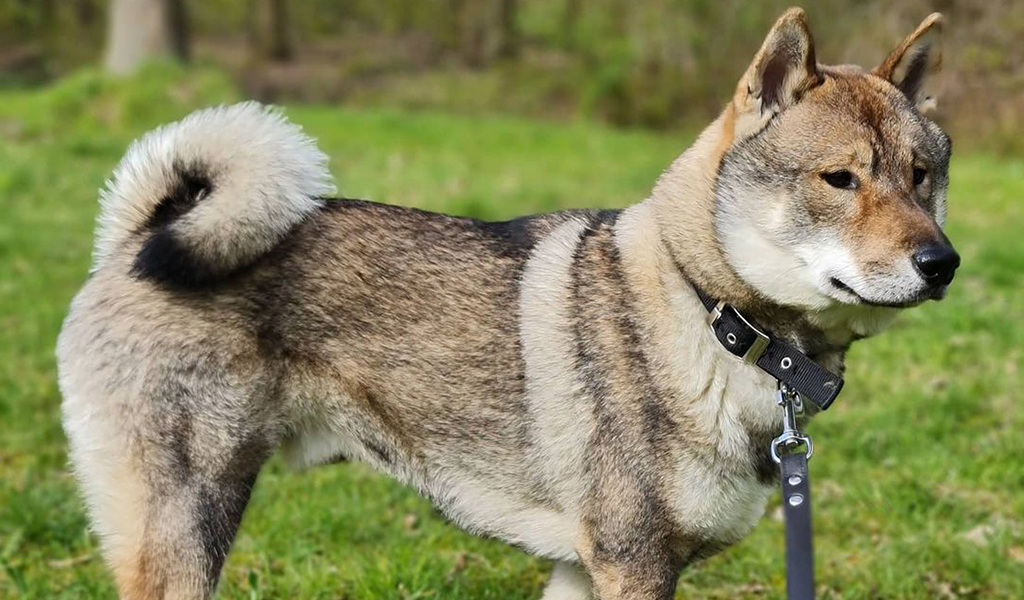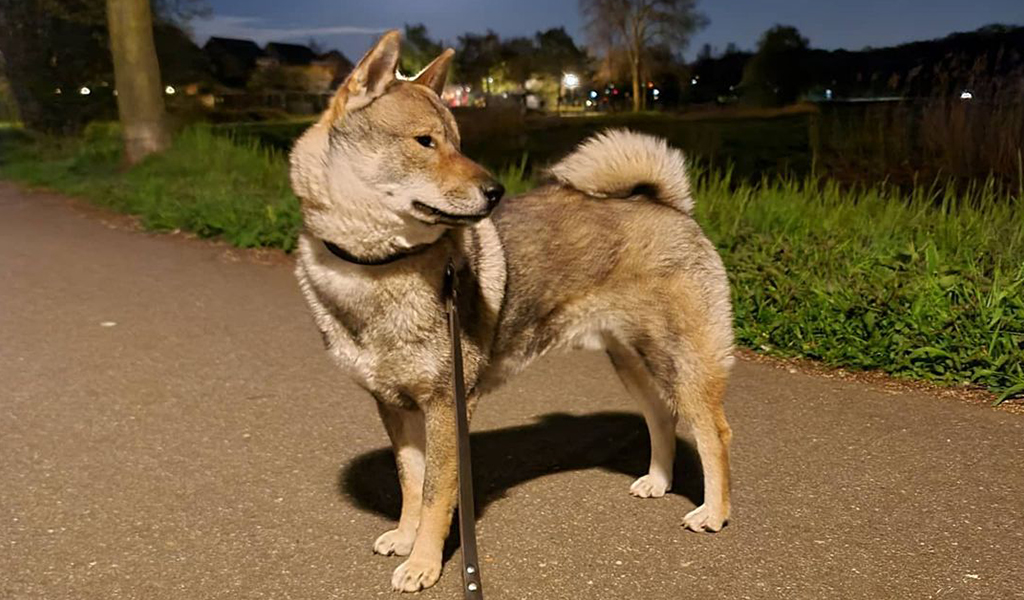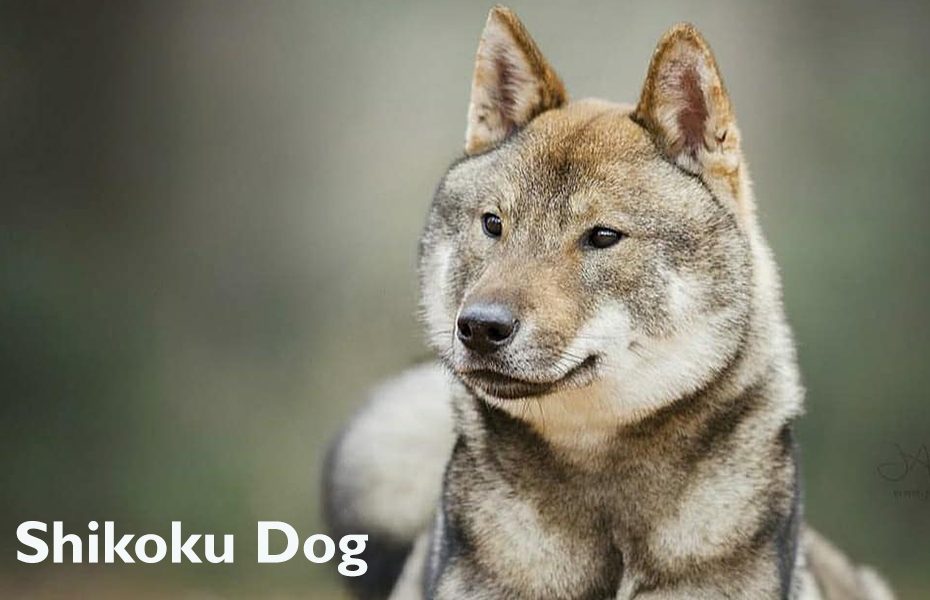The Shikoku reaches 17–21 inches (43–53 cm) high and appears in red, black, nonstandard color, or cream. These colors normally consist of a light brown, a light red-brown, or a light black-brown. In addition, there is typically a hybrid of white obtained about the underside of the body, near the eyes, snout, and legs.
The Shikoku dog has a fairly thick coat with pointed ears and a curved tail. The body conformation is typical of the square body’s spitz-type, the wedge-shaped head, the prick triangular ears, and the feathered curled tail.
It is careful and brave, a moderate dog with good judgment. The Shikoku is also very faithful and submissive to its owner; it loves to be involved and frequently likes to kiss. Although, it may be somewhat reserved with strangers.
Shikoku can become along with children if they are trained accurately and vice-versa. However, they have a high victim drive and may not be for everyone; they should not be trusted with non-canine favorites such as guinea pigs and hamsters.
History of Shikoku Dog
The Shikoku is also recognized as the Kochi-ken “ken” or “inu,” which implies Japanese dogs. Kin to the smaller Shiba Inu and larger Akita Inu, the Shikoku-ken is a unique dog breed, even in its native Japan.
In 1937, the Shikoku was established as one of Japan’s national treasures. The Japanese bred the Shikoku to hunt deer and wild boar in the mountainous and fairly isolated Kochi prefecture located on the island of Shikoku.
Shikokus are the most real dog breeds due to the exclusive nature of the province, which exceedingly restrained crossbreeding. In North America, the Shikoku is recognized by the Canadian Kennel Club and the United Kennel Club.
Other names: Kochi-ken, Mikawa Inu, Japanese Wolfdog, and Shikoku-Ken
Temperament
Shikoku dogs are typically strong but careful and very observant to their surroundings. However, they should be delicate without being apprehensive. The dog’s overall movement is elegant, and it should walk with flexible steps.
Shikoku dogs are tough, agile, and adequately powerful to run through the mountainous region. As a result, they are an outstanding companion for effective outdoor people, though they can be challenging to off-leash train. They are very energetic and passionate outside, but they are commonly calm and peaceful indoors.
The Shikoku is a highly talented dog and an immediate learner. They are not as stubborn and confident as some of the different native Japanese breeds but still require patience to train.
Personality
Shikoku Dog is Loyal, peaceful, and focused; they make an excellent protector to a comparable human. Even though they are an antique hunting dog breed, the Shikoku doesn’t require ample space to run approximately, like a yard. They are active pups, and if they’re bored, they’ll discover ways to entertain themselves in the home, some of which may be damaging and undesired habits.
It is so essential to begin training and socializing your Shikoku as soon as possible. The Shikoku can become moderately aggressive towards strangers, different animals, or anyone they understand as a warning to their human you!
Appearance
The Shikoku dog has a dense dual coat in red, red-sesame, and blackish or black-sesame. The under coat is thick and robust, but the outer coat is smooth to the touch. This coat blows seasonally, but Shikoku coat maintenance isn’t that challenging aside from the extra cleaning upkeep.
The Shikoku dog is moderately advanced in its appearance. It looks similar to a Siberian husky dog physically but differs in size and color. The Shikoku Inu varies from thirty to fifty-five pounds, male; around 20 inches tall; female; approximately 18.5 inches tall. Therefore, this dog would be regarded as medium-sized.
Shikoku Dog Characteristics
Origin: Japan
Breed Group: Northern Breed (UKC)
Size: Medium
Type: Purebred
Life span: 10-12 years
Temperament: Agile, Brave, Cautious, Energetic, Intelligent, Loyal
Height: 7-21 inches (46-52 cm)
Weight: 35-50 pounds (16-26 kg)
Colors: Black, Black and Tan, Cream
Litter Size: 4-6 puppies
Puppy Prices: Average $3000 – $4000 USD
Recognition
- ACA = American Canine Association Inc.
- AKC/FSS = American Kennel Club Foundation Stock Service® Program
- ARBS = American Rare Breed Association
- CKC = Canadian Kennel Club
- DRA = Dog Registry of America, Inc.
- JKC = Japanese Kennel Club
- UKC = United Kennel Club
Shikoku Puppy Feeding
An ideal Shikoku dog diet should be formulated for a medium-sized breed with medium-to-high amounts of energy. Shikoku dogs are inclined to growing overweight, improving this breed’s possibilities of hip or elbow dysplasia. Keep your Shikoku in good shape by measuring their food and feeding them twice a day, preferably than leaving food out all the time.
The Shikoku’s dietary requirements will increase from puppyhood to adulthood and change in their superior years. Therefore, it would help if you asked your vet for recommendations about your Shikoku’s diet, as there is far too much variation amongst particular dogs, including weight, energy, and health, to produce a special reference.
Exercise for Shikoku Dog
The most significant feature of your Shikoku’s concern is making assured they’re accurately socialized and exercised. If they don’t get adequate exercise, they can become destructive. They have high victim energy and may receive themselves into the problem, caught by a car while pursuing an animal.
Shikoku dogs perform best with a good significance of exercise; they require be taking on a regular walk or running. Do not lease this dog roam-free in an insecure area. However, they are springy and powerful dogs and exhibit skills that may give them talent in the activity or obedience utility.
The Shikoku is a hunting dog with energy to burn. Owners must perform to furnishing excellent regular exercise and mental stimulation. Provide him with an adequate everyday habit for him to be happy. They will flourish with lots of outside exercises, stimulating movements, and firm but considerate guidance from their family. Your dog will also require frequent working time with you and the family. For example, a Shikoku and will love getting to go for great walks, bike trips, and enjoy many games.
Training for Shikoku Puppies
Shikoku dog is a very powerful, intelligent, excellent sporting dog breed, and training is necessary to socialize with another dog breeds and nearby people. The elegant, stoic Shikoku Ken may be standoffish with strangers and need explicit training to strength guarding abilities.
A Shikoku dog is a hunting dog that can be highly destructive and effective; thus, training right from the beginning months is essential. In addition, it is desirable to train their mental stimulation to understand how to perform precisely with different people.
1. Commands
The Shikoku puppy can get to learn basic commands, like “sit”, “stay”, “down” or “heel”. The best way to discipline a Shikoku puppy or adult is by leading them with confidence and quality.
Teach solely command at a time. Your Shikoku dog has mastered the basic commands, attempt teaching him a lot of advanced commands and tricks.
2. Barking
Shikoku dogs do not bark plenty. Someday once they see a stranger person close to them than they’ll bark. Barking may be a dangerous habit. If your pup bark at unknown than never instantly attend to them
3. Bite
Teach your pup “leave it” command. Whenever he tries to bite you at this time, even once you aren’t sporting those specific things. Once he stops biting you once you tell him to ‘leave it’, then praise him and provides him a treat.
4. Potty
Potty coaching is extremely necessary for them. You also got to constantly take puppies resolute go potty. Permit them to move into a washroom after a meal, water, a nap, and playtime.
How to Bath Shikoku Dog?
An exceptional bath and brushing are all the Shikoku Ken require to stay fresh. In addition, this breed’s thick, fast-growing nails need frequent trimming to avoid splitting, cracking, or becoming huge, which can be unpleasant.
The occasional bath will preserve them neat and looking they are most beneficial. Over-bathing may wipe out their skin, and accordingly, a bath every several months is regularly sufficient. They do not have a powerful doggy odor.
You can keep your pup’s coat healthy and well-groomed by brushing them once a week. Their coats dry super slowly, so preserve baths for truly untidy, muddy times!
Shikoku Health Problems
Shikoku dogs are normally healthy but similar to all dog breeds, and they can be subjected to specific health disease situations. Not all Shikoku dogs will get any or all of these diseases, but it’s necessary to conserve them if you’re considering this breed.
Some of the other ordinary health’s problems Shikoku suffers from include:
1. Hip or elbow dysplasia
Hip dysplasia is an abnormality of the hip joint where the socket portion doesn’t fully cowl the ball portion, resulting in an increased risk for joint dislocation. Hip dysplasia may occur at birth or develop in early life.
Symptom:
- Decreased vary of motion.
- Difficulty or reluctance rising, jumping, running, or ascension stairs.
- Limping or stiffness
- Decreased activity.
2. Patella luxation
Patella luxation is ordinarily described by a ‘skipping’ or ‘hopping’ lameness, where the dog or cat will hold their leg up for some steps whilst running and then reverts to standard.
Symptoms:
- Abnormally carrying leg or legs
- Inability to bend the knee
- Pain when moving the leg
3. Epilepsy
4. Allergies
Shikoku Dog with Kid’s & Family
Shikoku dog is careful and brave, a mild dog with good knowledge. The Shikoku is also quite faithful and submissive to its owner; it loves to be touched and often prefers to kiss. Although, it may be somewhat aloof with strangers.
Shikoku can get along with children if they are established accurately and vice-versa. Shikoku dogs count out of 5 on the order of breeds admitted the friendliest dogs to strangers.
Advantages & Disadvantages
Advantages
- Beautiful, low-maintenance coat
- Active and energetic companion
- Docile and obedient with its owner
Disadvantages
- High prey drive not safe off leash
- Territorial and may be aggressive with animals
- Requires abundant exercise, socialization, and training
Shikoku Dog Images




